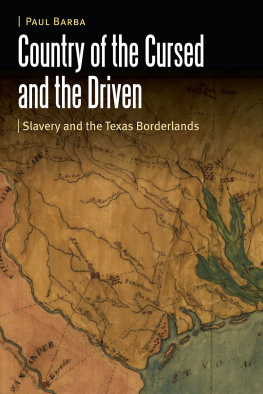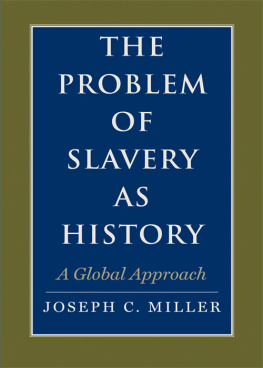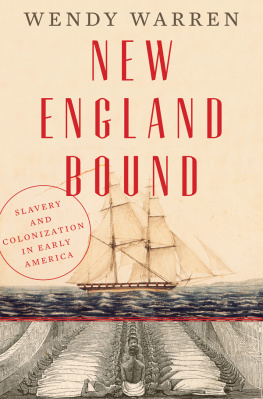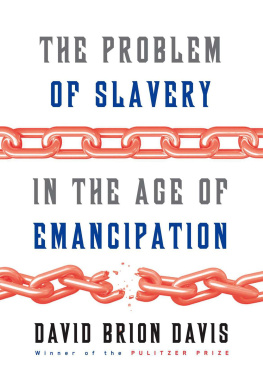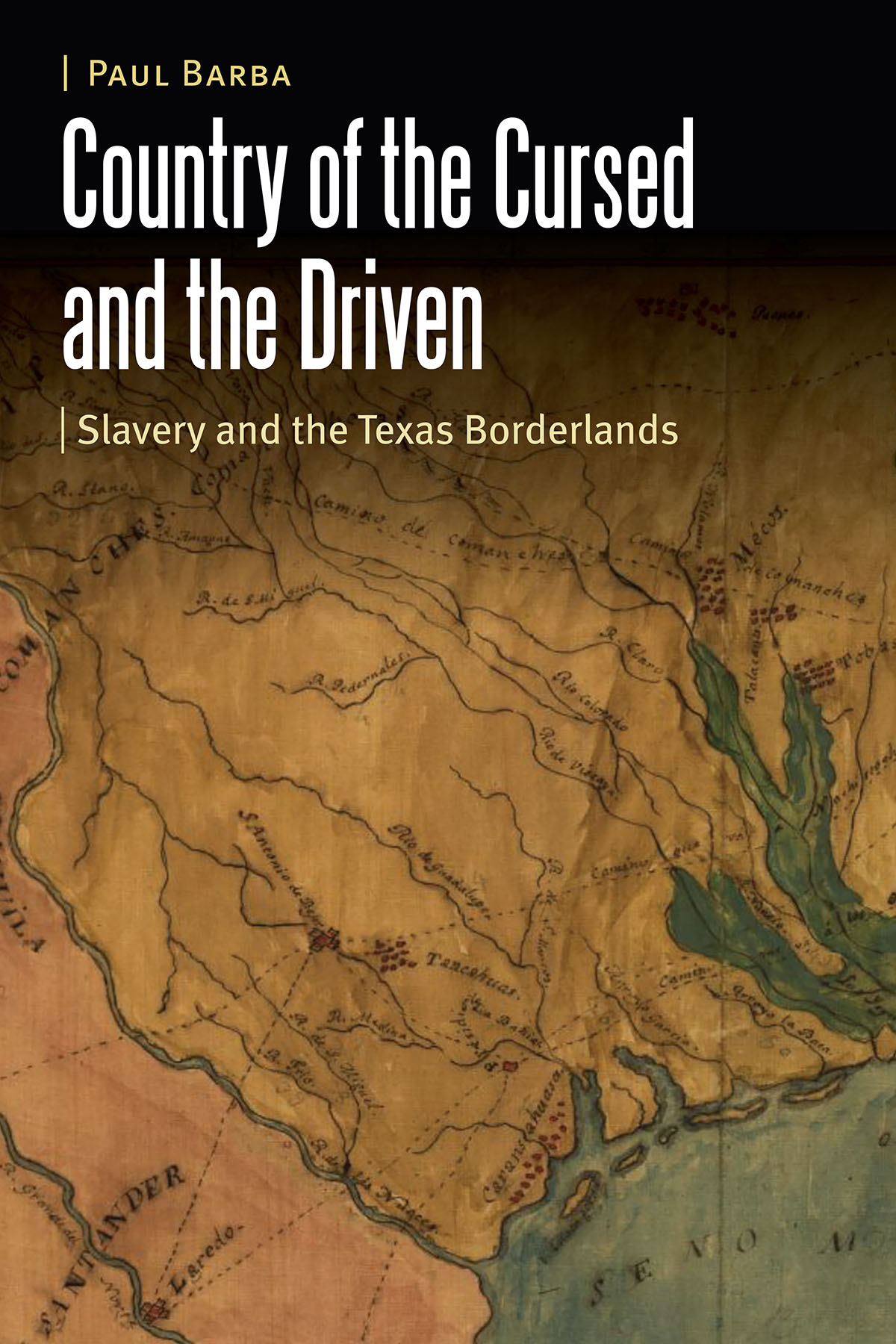

Early American Places is a collaborative project of the University of Georgia Press, New York University Press, Northern Illinois University Press, and the University of Nebraska Press. The series is supported by the Andrew W. Mellon Foundation. For more information, please visit www.earlyamericanplaces.com.
ADVISORY BOARD
Vincent Brown, Duke University
Cornelia Hughes Dayton, University of Connecticut
Nicole Eustace, New York University
Amy S. Greenberg, Pennsylvania State University
Ramn A. Gutirrez, University of Chicago
Peter Charles Hoffer, University of Georgia
Karen Ordahl Kupperman, New York University
Mark M. Smith, University of South Carolina
Rosemarie Zagarri, George Mason University
BORDERLANDS AND TRANSCULTURAL STUDIES
Series Editors
Pekka Hmlinen, Paul Spickard
COUNTRY OF THE CURSED AND THE DRIVEN
Slavery and the Texas Borderlands
PAUL BARBA
University of Nebraska Press
LINCOLN
2020 by the Board of Regents of the University of Nebraska
Cover designed by University of Nebraska Press; cover image is from the Library Of Congress Geography and Maps Division.
All rights reserved
Library of Congress Control Number: 2021936392
The publisher does not have any control over and does not assume any responsibility for author or third-party websites or their content.
To all my family
CONTENTS
MAPS AND TABLES
ACKNOWLEDGMENTS
This book emerged from an enormity of labor, attention, support, care, and love from others. Im indebted to the people of UC MEXUS, whose institution subsidized my early research as a mostly unfunded graduate student at the University of California, Santa Barbara. With their dissertation grant, I was able to travel to Austin on numerous occasions to conduct critical research at the Texas State Library and the University of Texas, where I met the wonderful people of those institutions. Special thanks go out to Kathryn Kenefick, Sarah Cleary, and the many others who welcomed me to the Dolph Briscoe Center for American History. My project also benefited greatly from two very generous grants at Bucknell University, the C. Graydon and Mary E. Rogers Faculty Fellowship and the Andrew W. Mellon Bridge to Retirement Research Grant. These awards allowed me to return to Texas, where I explored more local archives, including the Austin History Center and the Bexar County Spanish Archives. The two grants also financed my acquisition of materials from various digital archives, which pushed me into new interpretive directions.
I will always be fond of the people of UCSB. The Black Studies Department laid the philosophical groundwork of my larger research endeavors as an undergrad and then continued to cultivate my intellectual passions in the years that followed as a graduate student. Chris McAuley generously offered his guidance throughout my (long) student career at UCSB, and others from the department, especially the late great Otis Madison, Jude Akudinobi, Douglas Daniels, and Earl Stewart, kept me reeled in. The UCSB History Department, of course, was my academic home. Pat Cohen, Salim Yaqub, Randy Bergstrom, Sarah Cline, Ann Plane, Mhoze Chikowero, and Beth Digeser supported me during those pivotal moments of my graduate career, and Pekka Hmlinen and James Brooks kindly humored me when I shared my mostly half-baked research aspirations with them during the earliest stages of this project. John Majewski never hesitated to offer his assistance or encouragement, and Vernica Castillo-Muoz taught me to reach for the stars in academia. Without my two primary mentors, Carl Harris and Paul Spickard, neither this book nor my scholarly career would exist. Paul rescued me from my aimless wanderings of early graduate school and then carried me across the doctoral finish line, all while balancing committee work for a million other graduate students. Carl was the first person to tell me that I belong in academia; I only wish he were still around to read this book, the payoff of all the faith he put in me as a young student of history. Thank you, Paul and Carl. Id be remiss to ignore the formative support and care of Jeff Landeck, Olivia Walling, Ryan Abrecht, David Baillargeon, Hanni Jalil-Paier, Chris Kegerreis, Eric Massie, Ross Melczer, Brian Tyrrell, and (my man) Jackson Warkentin, who, in their own unique ways, all provided motivation, recommendations, provocative discussion, sounding boards, and, above all, friendship.
My time at Bucknell has been short but no less important. Colleagues from all over campus have transformed how I think about not just my research but my place in academia at large. Khalil Saucier and Jaye Austin Williams of the Africana Studies Program have pressed me to rethink many of my interpretations at a fundamental level. Im immensely indebted to both for their intellectual generosity. Obed Lira and Adam Burgos are professionals at indulging me in fascinating philosophical conversations, which certainly helped to fine-tune various aspects of this book, and Anthony Stewarts mentorship kept me propped up amid the trials of early professorship. Luyang Ren, Bucknells GIS and Web application specialist, went above and beyond her job obligations to transform my rough map ideas into legible cartographic representations. Im especially grateful for my (current and former) colleagues in the History Department, who have welcomed me with open arms since day one. Beeta Baghoolizadeh, Casey Bohlen, Claire Campbell, David Del Testa, Mehmet Dosemeci, John Enyeart, Cymone Fourshey, Jay Goodale, Jennifer Kosmin, Mark Sheftall, Jennifer Thomson, and Ann Tlusty all offered critical, constructive feedback on some portion of this book (and Liz Loss coordinated many of my research efforts), with John and Casey especially dedicating extra labor to my manuscript. I couldnt have asked for a better group of people to work with.
The University of Nebraska Press staff are the best. Matt Bokovoy is a stellar, super-accommodating acquisitions editor, who kept up my confidence throughout the entire publication process, and others, including Heather Stauffer, were equally supportive. Of course, UNP reached out to my excellent readers, whose close, generous parsing of my manuscript offered me a strong foundation for imagining a path to finalizing this book. Im particularly grateful for Todd Wahlstroms detailed analysis of my work and his many astute recommendations, as well as Alan Gallays early encouragement and feedback. UNP also connected me to the great people of the Early American Places Initiative, who guided me through the final stages of publication. Thank you all for making my publishing aspirations a reality. And as I made final revisions, I was also fortunate to cross paths with Max Flomen, who kindly offered his own expert perspective and supportive input.
Although this book asks some tough questions about the nature of family, I have only affection and admiration for mine. I want to thank my extended kin, including my many aunts, uncles, and cousins, for keeping me grounded in general. Its easy to get lost in the worlds of books, essays, and old documents, but relatives are great at reminding me that I cant forget about this world. I especially want to make a shoutout to my in-laws, Cindie Grisso, Chet Grisso, Cyla Fisk, Ryan Fisk, and Sherri McMackins; my cousin Daniel Martin; and my godparents, Mina Tacata and Robert Tacata, who have all been unwavering in their love and support.
Next page
